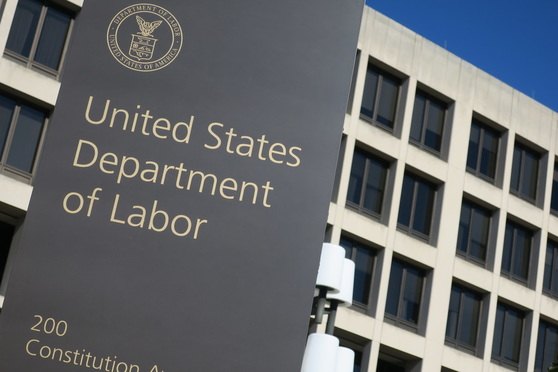US Labor Regulators Fight Oracle's Push to End Pay-Equity Case
U.S. Labor attorneys contend in a new filing that the agency's 40 administrative law judges were lawfully appointed by Labor Secretary Alexander Acosta, and that the case against Oracle should be allowed to proceed.
November 26, 2018 at 05:43 PM
3 minute read
The original version of this story was published on The Recorder
 Labor Department headquarters. Credit: Michael A. Scarcella/ ALM
Labor Department headquarters. Credit: Michael A. Scarcella/ ALM
The U.S. Labor Department, resisting Oracle America Inc.'s effort to end a pay-equity lawsuit, said the tech company is wrong that all of the agency's administrative law judges are unlawfully hearing cases after the U.S. Supreme Court threw the appointment of in-house judges into question.
U.S. Labor attorneys contend in a new filing that the agency's 40 administrative law judges were lawfully appointed by Labor Secretary Alexander Acosta, and that the case against Oracle should be allowed to proceed.
Labor regulators sued Oracle in January 2017, alleging Oracle's compensation practices discriminate against female, African-American and Asian employees. Oracle's attorneys deny the claims, and they are mounting a new effort to squash the case based on a U.S. Supreme Court ruling from June.
Oracle's lawyers at Orrick, Herrington & Sutcliffe point to the Supreme Court's ruling in the case Lucia v. SEC, which set new requirements for how in-house judges are appointed. The attorneys argue the Labor Department's lawsuit should be dismissed or paused until new administrative law judges are appointed.
Jeremiah Miller, acting counsel for civil rights in the Labor Department's Office of the Solicitor, said Acosta's ratification of the in-house judges in December “cured any constitutional defect” and said Acosta's move was “unequivocal.”
“Oracle's argument that the ratification lacks 'gravitas' has no merit,” Miller wrote in the new filing. He said Oracle's attempt to make a distinction between ratification and appointment “collapses under its own weight.”
Before the Supreme Court court issued its ruling in Lucia, Acosta ratified all of the agency's administrative law judges, an attempt to head off challenges against the rulings in those courts.
The Supreme Court's ruling says agency heads—such as Acosta—do have the power to appoint administrative judges. Oracle's attorneys contend that ratification alone isn't sufficient. Acosta's ratification letters, according to Oracle's lawyers, “bear none of the necessary hallmarks for a proper appointment.”
The ruling in Lucia carried wide implications, setting up fresh arguments for companies and individuals at the U.S. Securities and Exchange Commission and across all federal agencies.
The Labor Department's case against Oracle is one of several big carryover matters from the Obama era. In another pending case, against JPMorgan Chase & Co., an agency lawyer asked the administrative law judge to reassign the dispute to a different judge.
The Labor Department's response to Oracle is posted below:
Read more:
Oracle Uses Supreme Court Ruling to Attack Regulator's Discrimination Claims
With Oracle Bias Suit, Tech Firms Feel Labor Dept.'s Unwelcome Gaze
This content has been archived. It is available through our partners, LexisNexis® and Bloomberg Law.
To view this content, please continue to their sites.
Not a Lexis Subscriber?
Subscribe Now
Not a Bloomberg Law Subscriber?
Subscribe Now
NOT FOR REPRINT
© 2025 ALM Global, LLC, All Rights Reserved. Request academic re-use from www.copyright.com. All other uses, submit a request to [email protected]. For more information visit Asset & Logo Licensing.
You Might Like
View All
'Religious Discrimination'?: 4th Circuit Revives Challenge to Employer Vaccine Mandate
2 minute read
4th Circuit Revives Racial Harassment Lawsuit Against North Carolina School District
3 minute read
Reported Refusal to Officiate Gay Wedding Prompts Review by NY Judicial Misconduct Watchdog

Why ACLU's New Legal Director Says It's a 'Good Time to Take the Reins'
Trending Stories
- 1Courts Demonstrate Growing Willingness to Sanction Courtroom Misuse of AI
- 2The New Rules of AI: Part 1—Managing Risk
- 3Change Is Coming to the EEOC—But Not Overnight
- 4Med Mal Defense Win Stands as State Appeals Court Rejects Arguments Over Blocked Cross-Examination
- 5Rejecting 'Blind Adherence to Outdated Precedent,’ US Judge Goes His Own Way on Attorney Fees
Who Got The Work
J. Brugh Lower of Gibbons has entered an appearance for industrial equipment supplier Devco Corporation in a pending trademark infringement lawsuit. The suit, accusing the defendant of selling knock-off Graco products, was filed Dec. 18 in New Jersey District Court by Rivkin Radler on behalf of Graco Inc. and Graco Minnesota. The case, assigned to U.S. District Judge Zahid N. Quraishi, is 3:24-cv-11294, Graco Inc. et al v. Devco Corporation.
Who Got The Work
Rebecca Maller-Stein and Kent A. Yalowitz of Arnold & Porter Kaye Scholer have entered their appearances for Hanaco Venture Capital and its executives, Lior Prosor and David Frankel, in a pending securities lawsuit. The action, filed on Dec. 24 in New York Southern District Court by Zell, Aron & Co. on behalf of Goldeneye Advisors, accuses the defendants of negligently and fraudulently managing the plaintiff's $1 million investment. The case, assigned to U.S. District Judge Vernon S. Broderick, is 1:24-cv-09918, Goldeneye Advisors, LLC v. Hanaco Venture Capital, Ltd. et al.
Who Got The Work
Attorneys from A&O Shearman has stepped in as defense counsel for Toronto-Dominion Bank and other defendants in a pending securities class action. The suit, filed Dec. 11 in New York Southern District Court by Bleichmar Fonti & Auld, accuses the defendants of concealing the bank's 'pervasive' deficiencies in regards to its compliance with the Bank Secrecy Act and the quality of its anti-money laundering controls. The case, assigned to U.S. District Judge Arun Subramanian, is 1:24-cv-09445, Gonzalez v. The Toronto-Dominion Bank et al.
Who Got The Work
Crown Castle International, a Pennsylvania company providing shared communications infrastructure, has turned to Luke D. Wolf of Gordon Rees Scully Mansukhani to fend off a pending breach-of-contract lawsuit. The court action, filed Nov. 25 in Michigan Eastern District Court by Hooper Hathaway PC on behalf of The Town Residences LLC, accuses Crown Castle of failing to transfer approximately $30,000 in utility payments from T-Mobile in breach of a roof-top lease and assignment agreement. The case, assigned to U.S. District Judge Susan K. Declercq, is 2:24-cv-13131, The Town Residences LLC v. T-Mobile US, Inc. et al.
Who Got The Work
Wilfred P. Coronato and Daniel M. Schwartz of McCarter & English have stepped in as defense counsel to Electrolux Home Products Inc. in a pending product liability lawsuit. The court action, filed Nov. 26 in New York Eastern District Court by Poulos Lopiccolo PC and Nagel Rice LLP on behalf of David Stern, alleges that the defendant's refrigerators’ drawers and shelving repeatedly break and fall apart within months after purchase. The case, assigned to U.S. District Judge Joan M. Azrack, is 2:24-cv-08204, Stern v. Electrolux Home Products, Inc.










